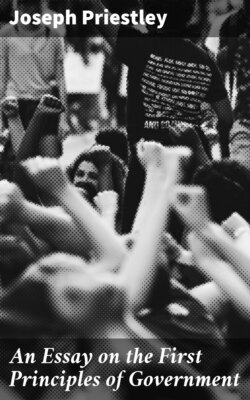An Essay on the First Principles of Government

Реклама. ООО «ЛитРес», ИНН: 7719571260.
Оглавление
Joseph Priestley. An Essay on the First Principles of Government
An Essay on the First Principles of Government
Table of Contents
I.—Of the first principles of government, and the different kinds of liberty,
SECTION I
II. Of political liberty,
SECTION II
POLITICAL LIBERTY
III. Of civil liberty,
SECTION III
CIVIL LIBERTY
Of the nature of Civil Liberty in general
IV. In what manner an authoritative code of education would affect political and civil liberty,
SECTION IV
V. Of religious liberty and toleration in general,
SECTION V
Of Religious Liberty, and Toleration in general
VI. Some distinctions that have been made on the subject of religious liberty and toleration considered,
SECTION VI
VII. Farther observations concerning the extent of ecclesiastical authority, and the power of civil governors in matters of religion,
SECTION VII
VIII. Of the necessity or utility of ecclesiastical establishments,
SECTION VIII
Of the necessity, or utility, of ecclesiastical establishments
IX. A review of some particular positions of Dr. Balguy's, on the subject of church authority,
SECTION IX
X. Of the progress of civil societies, to a state of greater perfection, shewing that it is retarded by encroachments on civil and religious liberty,
SECTION X
Отрывок из книги
Joseph Priestley
Published by Good Press, 2021
.....
To say that these forms of government have been long eslablished, and that these oppressions have been long suffered, without any complaint, is to supply the strongest argument for their abolition. Lawyers, who are governed by rules and precedents, are very apt to fall into mistakes, in determining what is right and lawful, in cases which are, in their own nature, prior to any fixed laws or precedents. The only reason for the authority of precedents and general rules in matters of law and government, is, that all persons may know what is law; which they could not do if the administration of it was not uniform, and the same in similar cases. But if the precedents and general rules themselves be a greater grievance than the violation of them, and the establishment of better precedents, and better general rules, what becomes of their obligation? The necessity of the thing, in the changing course of human affairs, obliges all governments to alter their general rules, and to set up new precedents in affairs of less importance; and why may not a proportionably greater necessity plead as strongly for the alteration of the most general rules, and for setting up new precedents in matters of the greatest consequence, affecting the most fundamental principles of any government, and the distribution of power among its several members?
Nothing can more justly excite the indignation of an honest and oppressed citizen, than to hear a prelate, who enjoys a considerable benefice, under a corrupt government, pleading for its support by those abominable perversions of scripture, which have been too common on this occasion; as by urging in its favour that passage of St. Paul, The powers which be are ordained of God, and others of a similar import. It is a sufficient answer to such an absurd quotation as this, that for the same reason, the powers which will be will be ordained of God also.
.....